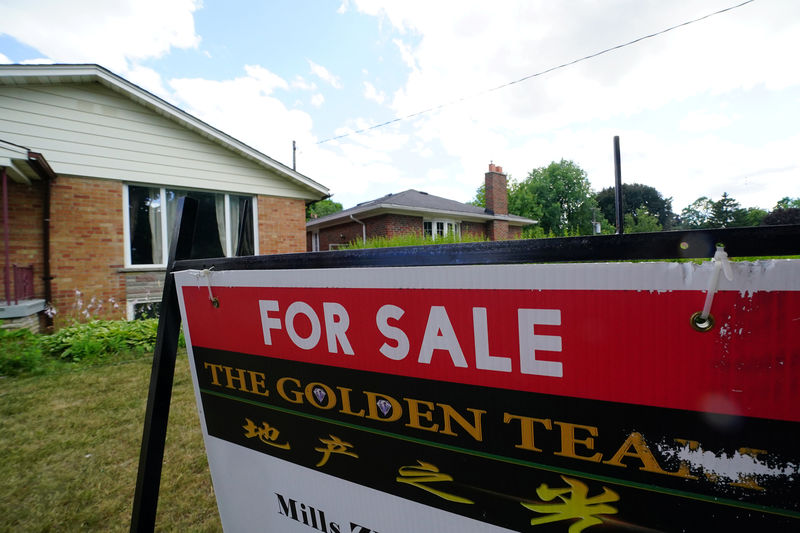 © Reuters. ‘For Sale’ sign is pictured in the front yard of a house in Toronto
© Reuters. ‘For Sale’ sign is pictured in the front yard of a house in TorontoBy Allison Martell
TORONTO (Reuters) – Canada’s housing agency has asked the country’s tax authority to take a “more direct and formal role” verifying income claimed on mortgage applications, part of a two-year plan to tackle mortgage fraud, documents obtained by Reuters show.
Unlike tax authorities in the United States and the United Kingdom, the Canada Revenue Agency (CRA) does not verify income for lenders, even with taxpayer’s consent.
That may change, as Canada’s overheated housing market draws comparisons to the United States in the years before the subprime mortgage crisis, made worse because many borrowers overstated their income.
“The CRA is currently exploring different avenues in which to improve how it delivers taxpayer specific information in a secure manner, including the feasibility of securely sharing tax information with financial institutions upon client consent,” the tax agency said in an emailed statement.
The Canada Mortgage and Housing Corporation (CMHC) action plan, obtained by Reuters under public records laws, shows the agency is concerned about systemic risk posed by mortgage fraud. The agency has said repeatedly that there is little evidence of widespread fraud in Canada, but it also says data is limited.
“The industry’s current detection tools have not kept pace with the increasing sophistication of threat we face,” says the plan, adding that paperless transactions, pressure to close deals quickly, rising prices and new regulations “create strong incentives for individuals or mortgage professionals to engage in opportunistic – or criminal – fraud.”
The documents describe several other initiatives, including the roll out of Citadel, software from Equifax (N:) that flags high-risk mortgage applications.
Isabel Vives, CMHC’s Manager, Mortgage Insurance Fraud Risk Management, said the agency has been testing Citadel since January and plans to go live within a few months.
“EASILY FALSIFIED”
In recent years, two Canadian lenders – Home Capital Group Inc (TO:) and Laurentian Bank of Canada (TO:) – have reported problems with borrowers misrepresenting their income in limited and specific groups of mortgages, although they did not involve unusual defaults. But as the CMHC plan notes, rising home prices and low unemployment can mask fraud.
In January 2017, Equifax Canada said its data had showed a 52 percent increase in suspected fraud since 2013, but did not say what proportion of applications were affected.
As a government-owned provider of residential mortgage insurance, the CMHC covers lenders’ losses when insured homeowners default, including some cases that involve fraud.
One issue flagged in the CMHC plan is the Canada Revenue Agency’s website, where taxpayers can print a copy of their notice of assessment, showing reported income. The report says the notice of assessment is “easily falsified.”
Lenders have other ways of verifying income, for example by calling employers, but the notice of assessment is widely used. Federal underwriting guidelines specifically mention it as one way of verifying self-employment income.
Vives said the original hard copy notice of assessment was printed on special paper, and while the online option is “wonderful” for taxpayers, industry will need to adapt.
“It means we need to make sure that we still have good, robust income verification,” she said. “We need to evolve too.”
Vives said the CMHC is also developing data-driven systems to screen for commission fraud, cases where a lender’s employee or brokers have encouraged borrowers to exaggerate their income.
The documents reveal that CMHC will start publishing statistics on mortgage fraud, which are not currently available in Canada. Vives says no date has been set.
The action plan highlighted risks associated with that project.
“Upward trends will generate concern, commentary and finger pointing,” it says. “Strong communications strategies will need to be in place.”
Source: Investing.com


























